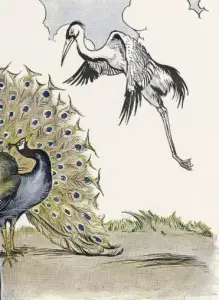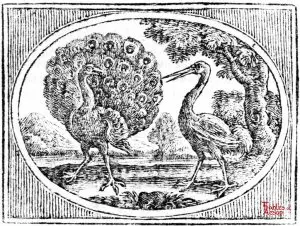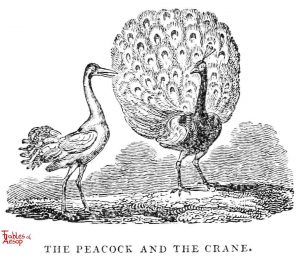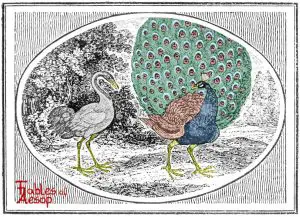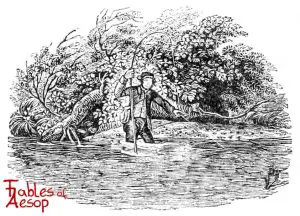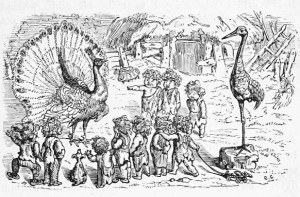A Peacock was strutting before a Crane saying how beautiful he was. The Crane pointed out that it could fly with his feathers instead of just strut around.
Fine feathers don’t make fine birds.

Aesop For Children
A Peacock, puffed up with vanity, met a Crane one day, and to impress him spread his gorgeous tail in the Sun.
“Look,” he said. “What have you to compare with this? I am dressed in all the glory of the rainbow, while your feathers are gray as dust!”
The Crane spread his broad wings and flew up toward the sun.
“Follow me if you can,” he said. But the Peacock stood where he was among the birds of the barnyard, while the Crane soared in freedom far up into the blue sky.
Moral
The useful is of much more importance and value, than the ornamental.

Townsend version
A peacock spreading its gorgeous tail mocked a Crane that passed by, ridiculing the ashen hue of its plumage and saying, “I am robed, like a king, in gold and purple and all the colors of the rainbow; while you have not a bit of color on your wings.” “True,” replied the Crane; “but I soar to the heights of heaven and lift up my voice to the stars, while you walk below, like a cock, among the birds of the dunghill.”
Moral
Fine feathers don’t make fine birds.

Samuel Croxall
THE Peacock and the Crane by chance met together in the same place. The Peacock, erecting his tail, displayed his gaudy plumes, and looked with contempt upon the Crane, as some mean ordinary person. The Crane, resolving to mortify his insolence, took occasion to say, that Peacocks were very fine birds indeed, if line feathers could make them so, but that he thought it a much nobler thing to be able to rise above the clouds, than to strut about upon the ground, and be gazed at by children.
THE APPLICATION
It is very absurd to slight or insult another upon his wanting any property which we possess; for he may, for any thing we knew, have as just reason to triumph over us, by being master of some good quality, of which we are incapable. But, in regard to the fable before us,that which the Peacock values himself upon, the glitter and finery of dress, is one of the most trifling considerations in nature; and what a man of sense would be ashamed to reckon even as the least part of merit. Indeed, children, and those people who think much about the same pitch with them, are apt to be taken with varnish land tinsel: but they who examine by the scale of common sense, must find something of weight and substance, before they can be persuaded to set a value. The mind, which is stored with virtuous and rational sentiments; and the behaviour, which speaks complacence and humility, stamps an estimate upon the possessor, which all judicious spectators are ready to admire and acknowledge. But if there be any merit in an embroidered coat, a brocade waistcoat, a shoe, a stocking, or a sword-knot, the person who wears them has the least claim to it; let it be ascribed where it justly belongs, to the several artisans who wrought and disposed the materials of which they consist. This moral is not intended to derogate any thing from the magnificence of fine clothes and rich equipages, which, as times and circumstances require, may be used with decency and propriety enough: but one cannot help being concerned, lest any worth should be affixed to them more than their own intrinsic value.

Thomas Bewick
The Peacock and the Crane having by chance met together, the Peacock erected his tail, displayed his gaudy plumes, and looked with contempt upon the Crane, as some mean ordinary person. The Crane resolving to mortify his insolence, took occasion to say, that Peacocks were very fine birds indeed, if fine feathers could make them so; but that he thought it a much nobler thing to be able to rise above the clouds into endless space, and survey the wonders of the heavens, as well as of the earth beneath, with its seas, lakes, and rivers, as far as the eye can reach, than to strut about upon the ground, and be gazed at by children.
APPLICATION
There cannot be a greater sign of a weak mind, than a person’s valuing himself on a gaudy outside, whether it consist of the beauties of the person, or the still more contemptible vanity of fine cloaths [Sic]. This kind of misguided pride, while it endeavours to exalt, commonly tends to lower the persons who are infected with it; but never renders them so truly ridiculous as when it inspires them with a contempt of those who have ten times more worth than themselves. To value ourselves upon the glitter and finery of dress is one of the most trifling of all vanities; and a man of sense would be ashamed to bestow upon it the least attention. They who examine things by the scale of common sense, must find something of weight and substance before they can be persuaded to set a value upon it. The mind that is stored with virtuous and rational sentiments, and the behaviour which is founded upon complacency and humility, stamp a value upon the possessor, which all men of discernment are ever ready to admire and acknowledge.

JBR Collection
The Peacock, spreading his gorgeous tail, stalked up and down in his most stately manner before a Crane, and ridiculed him for the plainness of his plumage. “Tut, tut!” said the Crane; “which is the better now, to strut about in the dirt, and be gazed at by children, or to soar above the clouds, as I do?”

Pavo et Grus
Pavo, coram grue pennas suas explicans, “Quanta est,” inquit, “formositas mea et tua deformitas!” At grus, evolans, “Et quanta est,” inquit, “levitas mea et tua tarditas!”
Perry #294
